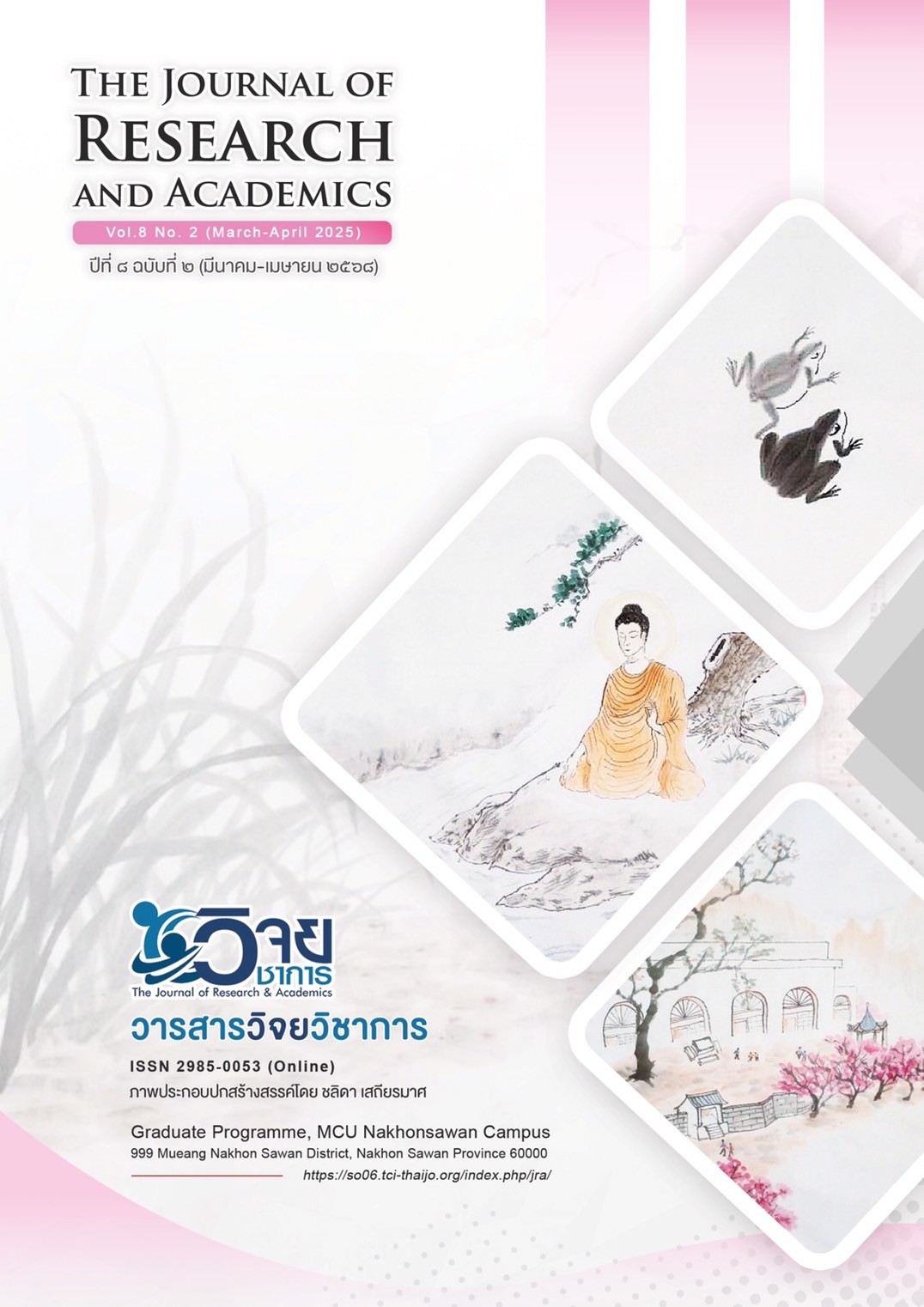Life Happiness of the Elderly
Main Article Content
Abstract
This academic article aims to present the concept of life happiness of the elderly, which means the elderly's perception in thinking, feeling, action, enthusiasm in life, physical health care, mental health care, optimism, positive relationships, flexibility in adjusting perspectives, and economic and social stability. The components or factors that cause happiness and affecte the change of thoughts and life are comprised of 5 components called the Perma model or the model that causes Eudaimonic Happiness in life that emphasizes the potential and prosperity of individuals as important, which is expressed as observable behaviors, namely, feeling good, having positive emotions, cooperating with social activities, having good relationships in all forms, understanding the meaning of life, and recognizing past successes in life. In addition, happiness in life of the elderly can be enhanced by applying various psychological theories to organize various psychological activities.
Article Details

This work is licensed under a Creative Commons Attribution-NonCommercial-NoDerivatives 4.0 International License.
1. เนื้อหาและข้อมูลในบทความที่ลงพิมพ์กับวารสารวิจยวิชาการ ถือเป็นข้อคิดเห็น และความรับผิดชอบของผู้เขียนบทความโดยตรงซึ่งกองบรรณาธิการวารสารไม่จำเป็นต้องเห็นด้วย หรือร่วมรับผิดชอบใด ๆ
2. บทความ ข้อมูล เนื้อหา รูปภาพ ฯลฯ ที่ได้รับการตีพิมพ์ในวารสารวิจยวิชาการ ถือเป็นลิขสิทธิ์ของวารสารวิจยวิชาการ หากบุคคลหรือหน่วยงานใดต้องการนำทั้งหมดหรือส่วนหนึ่ง ส่วนใดไปเผยแพร่ต่อหรือเพื่อการกระทำการใด ๆ จะต้องได้รับอนุญาตเป็นลายลักษณ์อักษรจากวารสารวิจยวิชาการก่อนเท่านั้น
References
เกสร มุ้ยจีน. (2559). การสร้างความสุขด้วยจิตวิทยาเชิงบวก. วารสารวิทยาศาสตร์และเทคโนโลยี, 24(4), 673-681.
กรมสุขภาพจิต กระทรวงสาธารณสุข. (2556). คู่มือ “ความสุข 5 มิติ” สำหรับผู้สูงอายุ. (พิมพ์ครั้งที่ 6). กรุงเทพฯ : โรงพิมพ์ชุมนุมสหกรณ์การเกษตรแห่งประเทศไทย จำกัด.
กันย์ธนัญ สุชิน, ธนพัทธ์ จันท์พิพัฒน์พงศ์ และทิพวรรณ เมืองใจ. (2563). การศึกษาและพัฒนารูปแบบเพื่อเสริมสร้างความสุขจากปัจจัยที่มีอิทธิพลต่อความสุขของผู้สูงอายุ อำเภอเชียงของ จังหวัดเชียงราย. วารสารชุมชนวิจัย, 14(3), 58-71.
ดุษฎี อายุวัฒน์ และคณะ. (2562). ความสุขในชีวิตของผู้สูงอายุภาคตะวันออกเฉียงเหนือ. วารสารภาษา ศาสนา และวัฒนธรรม, 8(1), 136-155.
ปรีชา อุปโยคิน. (2556). รูปแบบการควบคุมทางสังคมเพื่อการเลิกสูบบุหรี่: การบูรณาการความร่วมมือระหว่างเครือข่ายชุมชนกับระบบการบริการสุขภาพของรัฐระดับชุมชน. (รายงานการวิจัย). ศูนย์วิจัยและจัดการความรู้เพื่อการควบคุมยาสูบ : มหาวิทยาลัยแม่ฟ้าหลวง.
ปิยะ ศักดิ์เจริญ. (2558). ทฤษฎีการเรียนรู้ผู้ใหญ่และแนวคิดการเรียนรู้ด้วยการชี้นำตนเอง: กระบวนการเรียนรู้เพื่อการส่งเสริมการเรียนรู้ตลอดชีวิต. วารสารพยาบาลทหารบก, 16(1), 8-13.
พระพรหมคุณาภรณ์ (ป.อ. ปยุตฺโต). (2552). พุทธธรรม. (พิมพ์ครั้งที่ 11). กรุงเทพฯ : โรงพิมพ์มหาจุฬาลงกรณ์ราชวิทยาลัย.
พระสมุห์โชคดี วชิรปญฺโญ (ราโชกาญจน์), สิริวัฒน์ ศรีเครือดง และวิชชุดา ฐิติโชติรัตนา. (2564). รูปแบบการพัฒนาความสุขของผู้สูงอายุตามแนวพุทธจิตวิทยาในสังคมสมัยใหม่. วารสารครุศาสตร์ปริทรรศน์ฯ, 8(2), 41-53.
ภาคิน บุญพิชาชาญ, ศิริรัตน์ ปานอุทัย และเดชา ทำดี. (2565). ความรอบรู้ด้านสุขภาพจิตและความผาสุกทางใจในผู้สูงอายุที่มีภาวะพึ่งพิง. พยาบาลสาร มหาวิทยาลัยเชียงใหม่, 49(1), 186-97.
สถาบันวิจัยประชากรและสังคม. (2551). สารประชากรมหาวิทยาลัยมหิดล 17(มกราคม). เข้าถึงได้จาก https://ipsr.mahidol.ac.th/research_year/2551/
สราวุฒย์ วิจิตรปัญญา และคณะ. (2561). การพัฒนารูปแบบและกระบวนการดูแลสุขภาวะผู้สูงอายุในโรงเรียนผู้สูงอายุตามแนวพระพุทธศาสนา. (รายงานการวิจัย). มหาวิทยาลัยมหาจุฬาลงกรณราชวิทยาลัย : วิทยาลัยสงฆ์พ่อขุนผาเมือง.
อรพินทร์ ชูชม. (2559). โครงสร้างของความสุขและสุขภาวะในจิตวิทยาเชิงบวก. วารสารจิตวิทยามหาวิทยาลัยเกษมบัณฑิต, 6(2), 1-7.
อรรถกร เฉยทิม. (2560). ความสุขของผู้สูงอายุในชมรมผู้สูงอายุ เขตกรุงเทพมหานคร. (วิทยานิพนธ์ศิลปศาสตรมหาบัณฑิต). บัณฑิตวิทยาลัย : มหาวิทยาลัยศิลปากร.
อรัญญา ตุ้ยคำภีร์ และคณะ. (2562). มุมมองการสูงวัยอย่างมีความสุขและสุขภาวะ. (รายงานการวิจัย). กรุงเทพฯ : จุฬาลงกรณ์มหาวิทยาลัย.
อัญชลี เชี่ยวโสธร. (2566). การพัฒนารูปแบบการนำตนเองเพื่อเสริมสร้างความสุขในชีวิตของผู้สูงอายุในเขตกรุงเทพมหานคร. (ดุษฎีนิพนธ์ปรัชญาดุษฎีบัณฑิต สาขาวิชาจิตวิทยาเพื่อการพัฒนาศักยภาพมนุษย์). บัณฑิตวิทยาลัย : มหาวิทยาลัยเกษมบัณฑิต.
Bada, S. O. & Olusekun, B. S. (2015). Constructivism Learning Theory: A Paradigm for Teaching and Learning. IOSR Journal of Research & Method in Education, 5(6), 66-70.
Brooks, A. C. (2022). From strength to strength: Finding success, happiness and deep purpose in the second half of life. London : Bloomsbury Publishing.
Gilbert, D. (2006). Stumbling on happiness. New York : Alfred Knopf.
Madhi, S. & Najafi, M. (2018). The relationship between spiritual well-being and hope with quality of life, and happiness in older adults. Journal of Psychological Science, 17(65), 78-94.
May, R. & Yalom, I. (1995). Existential psychotherapy. In: Corsini, R.J., & Wedding, D., eds. Current Psychotherapies. (5th ed). Itasca, IL : F.E. Peacock.
Segura, A., Cardona, D., Segura, A., Robledo, C. A. & Munoz, D. I. (2003). The subjective perception of the happiness of older adult residents in Colombia. Frontiers in Medicine, 10. https://doi.org/10.3389/fmed.2023.1055572
Seligman, M. E. P. (2013). Flourish: a visionary new understanding of happiness and well-being. New York : Atria Books.
StonćikaitèORCID, I. (2019). Revising happiness and well-being in later life from interdisciplinary age-studies perspectives. Behavioral Sciences, 9(9), 94. https://doi.org/10.3390/bs9090094
Tian, H. & Chen, J. (2022). Study on Life Satisfaction of the Elderly Based on Healthy Aging. Journal of Healthcare Engineering, 7. https://doi.org/10.1155/2022/ 8343452
Vygotsky, L. & Cole, M. (2018). Lev Vygotsky: Learning and social constructivism. Learning theories for early years practice, 66, 58.
Wei, Y. & Tsay, W. J. (2022). Does Distance Make Happiness? Geographic Proximity of Adult Children and the Well-being of Older Persons. Journal of Aging & Social Policy, 36(2), 222-240. doi: 10.1080/08959420.2022.2080464.


